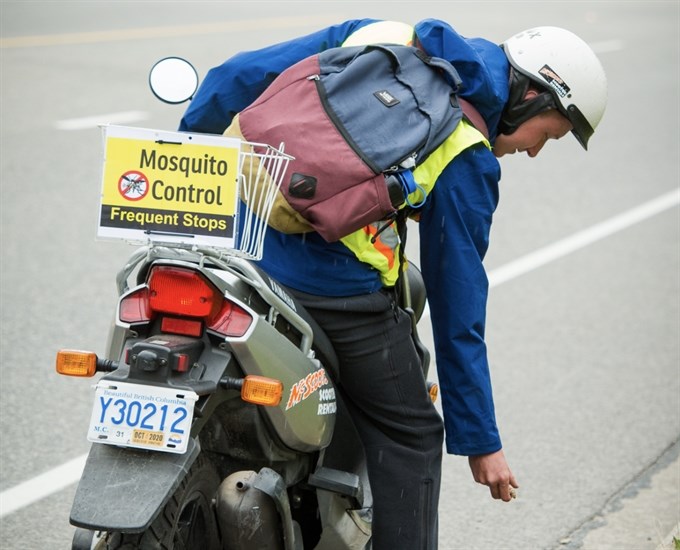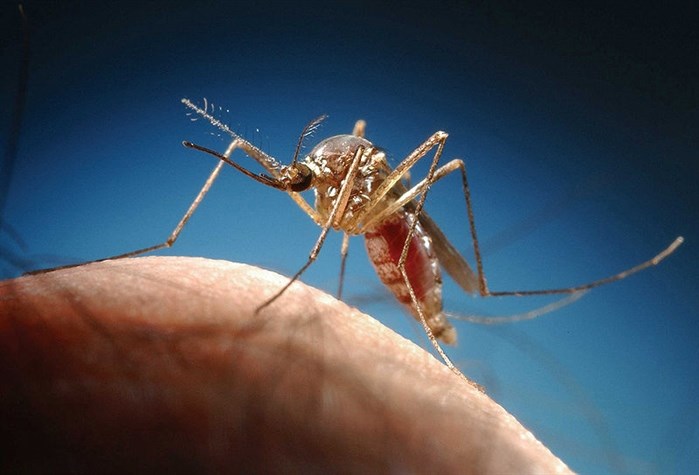
A worker with the mosquito control program on a moped.
Image Credit: FACEBOOK/Regional District of Central Okanagan
July 23, 2025 - 6:00 AM
In case you need another reason to want to visit the Okanagan, or a reminder to cherish this valley if you live here, think about how few mosquitoes are eating you alive.
The Regional District of Central Okanagan spends around $200,000 a year on its mosquito control program and has been running it for more than 30 years. The person in charge of mosquito control operations said the mitigation tactics and the Okanagan’s weather keep the pesky pests in check.
Duka Environmental Services is in charge of getting rid of the tiny pests in the Okanagan and other parts of B.C. and Curtis Fediuk is its senior biologist. He has been tackling mosquitoes for 40 years.
“What the program does up in Kelowna here is it focuses on larval control. We have well over three to four hundred sites that are mapped. They could be ponds, ditches, swamps, marshes, golf course ponds, basically standing water, mosquitoes like water that doesn't move,” he said.
Duka goes anywhere mosquitoes could spawn and sprays a special bacteria, commercially dubbed VectoBac, that only hurts mosquitoes. The mosquitoes eat the inactive bacteria and it essentially burns through their stomachs without harming other aquatic insects or predators.

Image Credit: Wikimedia Commons
On top of naturally occurring still water, there are roughly 12,000 roadside catch basins that are sprayed to kill off larvae. Folks can also reach out to the program to point out areas where mosquitoes are hatching so they can be sprayed.
In 2024, the two areas in the Central Okanagan with the most service requests to the mosquito mitigation program were in Kelowna in the Hall and Gallagher Roads area with 12 requests, and Mission area with 23 requests.
For some perspective when Regina counted its mosquitoes in the summer for one week in 2024 they caught 210 mosquitoes in a single trap, while the Central Okanagan regional district caught a total of 158 from various traps throughout the summer of 2024. The methods for trapping and counting mosquitoes are a bit different in each city, so it isn’t an exact comparison.
Going around and spraying mosquito larvae consistently for years is a major reason why there aren’t many mosquitoes in the Central Okanagan, but the weather also plays a major role.
Fediuk said consistently hot and dry summers dry up pools of water, and reduce the lifespan of adult mosquitoes.
“Hot, dry weather is the best natural killer for adult mosquitoes,” he said. “They can't regulate the water in their bodies. They can't close off these little pores on the outside of their bodies called spiracles, so they dry out.”
The Okanagan also has its fair share of birds and bats that like to eat mosquitoes, but Fediuk said while bats and birds are helpful they don’t eat nearly enough of the bugs to make a noticeable impact.
“When you can eat one beetle and get the equivalent of 30 mosquitoes without 30 times the energy, you're going to eat a beetle, right?” Fediuk said.
The mosquito mitigation program sprayed VectoBac on 128 hectares of mosquito spawning habitat in 2024 throughout Kelowna, Lake Country, Peachland, Westbank First Nation and parts of West Kelowna. Fediuk said it would take thousands of bats to eat the mosquitoes that could spawn in just one hectare.
Whether killing off all the mosquitoes in the area is a potential risk, Fediuk said it would be impossible to get rid of them entirely and that it wouldn’t have a disastrous impact on the natural food chain.
He said mosquitoes come into the area in all kinds of ways that would be impossible to eliminate and they aren’t a unique part of the ecosystem so another bug would likely take their place.
“The only thing that mosquitoes do that's kind of unique when you compare it to other flies is that they bite people and transmit disease,” he said.
If you’ve got mosquitoes in your yard, Fediuk recommends checking for still water in your gutters, bird baths, old tarps, old tires or even pools of water in your garden since mosquitoes can lay eggs in a puddle of water on top of the black material used to prevent weeds from growing.
To contact a reporter for this story, email Jesse Tomas or call 250-488-3065 or email the editor. You can also submit photos, videos or news tips to the newsroom and be entered to win a monthly prize draw. Find our Journalism Ethics policy here.
We welcome your comments and opinions on our stories but play nice. We won't censor or delete comments unless they contain off-topic statements or links, unnecessary vulgarity, false facts, spam or obviously fake profiles. If you have any concerns about what you see in comments, email the editor in the link above. SUBSCRIBE to our awesome newsletter here.
News from © iNFOnews, 2025